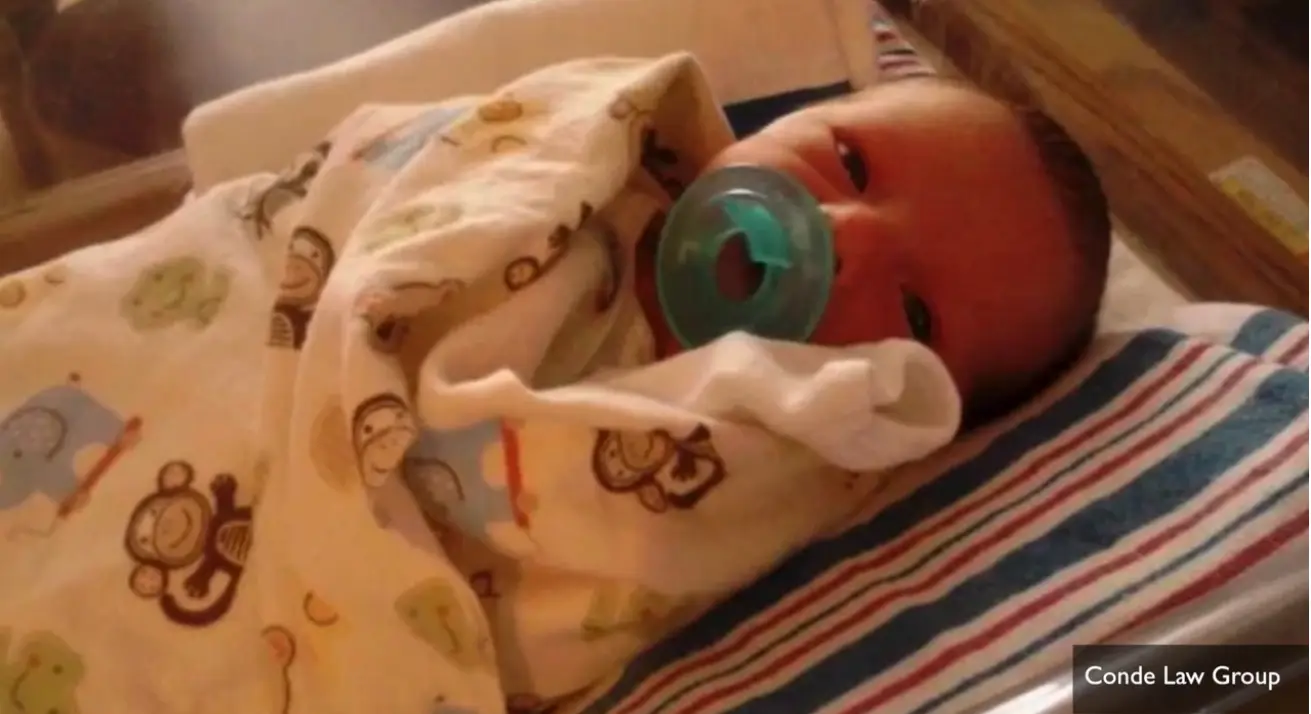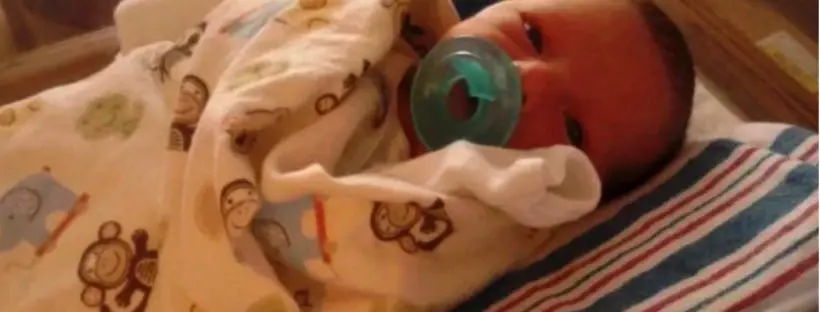Christie del Castillo-Hegyi, M.D.
Another day, another distortion pushed by supporters of the Baby-Friendly Hospital Initiative, who no longer have any reasonable justification for endangering newborns with their policies, namely policies that increase the risk of accidental suffocation, newborn falls and starvation-related brain injury from strict exclusive breastfeeding promotion. Never in the history of Western medicine have we had decades of scientific evidence that a public health policy increases the risk of brain injury, disability and death in infants while millions of dollars are used to promote the policies’ “benefits” while actively suppressing knowledge of its risks. Since they no longer have any defense for their unsafe practices, they use the old and tired argument that anyone who criticizes or raises awareness on the safety issues of their policies must be funded and influenced by formula industry.
The most recent attempt to suppress the opinions of its critics occurred on December 18, 2018 when Women’s eNews published a highly biased and inaccurate article aimed at discrediting one of the BFHI’s critics, Dr. Ronald Kleinman, who published an editorial along with two other pediatricians, Dr. Joel Bass and Dr. Tina Gartley, in the medical journal JAMA Pediatrics regarding the serious safety issues associated with the BFHI protocol, entitled, Unintended Consequences of Current Breastfeeding Initiatives.
One of those risks they discussed is the risk of accidental suffocation and newborn falls during prolonged skin-to-skin care and breastfeeding in hospitals. Multiple policies of the BFHI contribute to these devastating outcomes. The first is the recommendation that babies “room-in” 24/7 with mothers who are exhausted and sleep-deprived from hours and even days of labor, some of whom receiving pain medication for post-operative pain. Their sleep-deprivation is made worse by the requirement to have full responsibility for the care of the infant without respite. Step 6 of the BFHI guidelines states that breastfed newborns should receive no food or water other than breast milk, which commonly cause near continuously crying and nursing due to persistent hunger, a phenomenon widely known as “Second Night Syndrome.” Under these conditions, mothers have fallen asleep while breastfeeding their babies and doing prolonged, unsupervised skin-to-skin care, which in rare instances, have resulted in accidental suffocation of newborns, also known as Sudden Unexpected Postnatal Collapse. This has resulted in infant deaths and need for cardiopulmonary resuscitation, brain injury and lifelong disability among surviving infants. This phenomenon has become common enough to prompt the publication of an official American Academy of Pediatrics guideline entitled, “Safe Sleep and Skin-to-Skin Care in the Neonatal Period for Healthy Term Newborns,” which guides pediatricians on how to the reduce the risk of these complications among healthy, term newborns
According to the authors:
“An overly rigid insistence on these steps in order to comply with Baby-Friendly Hospital Initiative criteria may inadvertently result in a potentially exhausted or sedated postpartum mother being persuaded to feed her infant while she is in bed overnight, when she is not physically able to do so safely.”
They concluded that we should reconsider the call to increase implementation of the Baby-Friendly Hospital Initiative in the United States:
“Considering the available evidence, that recommendation [to increased implementation of the BFHI in the U.S.] should be reconsidered. If government and accreditation agencies wish to encourage and support breastfeeding, their focus should shift from monitoring Baby-Friendly practices and breastfeeding exclusivity to monitoring breastfeeding initiation rates coupled with evidence of lactation support both during and after the hospital stay…Hospitals should direct their efforts toward implementing practices that will promote breastfeeding safely, the common goal of both private and public groups with an interest in these issues.”
It is clear from this editorial that Dr. Kleinman, Dr. Bass and Dr. Gartley care about infant health and safety and wish to prioritize safe breastfeeding support of mothers and infants during the critical first days of life, which they do by calling for reforms of the BFHI policies and requirements that prevent that. Countless editorials by pediatricians and other physicians have expressed the exact same opinions about the rigid and unsafe guidelines of the BFHI, among them listed below this article.

According to the Washington Post, Jacob Thompson died of accidental suffocation when a nurse put him next to his mother, Monica Thompson, to breastfeed while she was sleepy and groggy. One-hour later, he was found unresponsive. Skin-to-skin care, maternal exhaustion and unsupervised breastfeeding in the postnatal period are known risk factors for Sudden Unexpected Postnatal Collapse. Six days later, Jacob died.
In response to a blog post I wrote, which I have since retracted, we received a message from the Massachusetts General Hospital (MGH) Senior Vice President for Research and Research Integrity Officer for the Harvard-affiliated MGH for Children, Dr. Harry Orf, Ph.D. regarding the Women’s eNews article. He wrote the following:
“I want to let you know that the article on which your disappointment is based was inaccurate and highly misrepresentative. I can attest that Dr. Kleinman has been diligent about appropriately disclosing all of his relationships because I conducted the assessment of these relationships following a complaint filed by an outside physician. I can assure you there was absolutely nothing unethical found in this review. In addition, you should know that Dr. Kleinman responded fully and honestly to every one of the questions he was asked by the Women’s eNews reporter. She, however, chose to misrepresent his words and produced a story that clearly was designed to discredit him.”
Dr. Orf shared with me the letter he sent to the reporter where he directly stated to the reporter, Rebecca Gale, “I found your story irresponsible and quite troubling.”
He stated the following about the story’s inaccuracies:
“I cannot figure out how you could produce the article you did if you had looked at the work that Dr. Kleinman has done, reviewed his papers, or followed up with the various associations that you mischaracterize as among his “vast industry connections.” I know that Dr. Kleinman provided straightforward and comprehensive responses to your many questions. And I am dismayed – and, frankly, stunned – that you chose to ignore most of this information, in some cases including in your story the opposite of the response he had given you with no balancing comment. As a result, you produced a misrepresentative and inaccurate story that seemed to be designed to fit the narrative that you set out to write – a narrative that had nothing whatsoever to do with fact.”
“Let me give you some specific examples of errors, misstatements and misleading comments.
- The premise in your headline and lead paragraph that Dr. Kleinman has come under scrutiny is flawed. He has not come under scrutiny. Harvard received one complaint, which was reviewed, as we are obligated to do. Our assessment identified no problems or concerns – nothing.
- In response to your question about whether industry-funded research influences outcomes, Dr. Kleinman said, “There certainly have been some high-profile examples of industry-initiated studies that have not had the appropriate firewalls between the funder and the investigators, and the influence of the funder is obvious.” Your article, however, twisted his comment around, saying, “Kleinman believes ‘appropriate firewalls’ exist, even in the face of other high-profile examples where industry influence is present.” This is a total mischaracterization of his response.
- You wrote that Dr. Kleinman has financial connections to juice manufacturers. This is not true, yet you included it even though Dr. Kleinman told you he has never received compensation nor had a relationship with the Fruit Juice Association. Perhaps you should have checked with the association directly if you didn’t accept Dr. Kleinman’s response.
- You wrote, “Harvard’s review did not find any official fault, but due to recent investigative reporting by the New York Times and ProPublica, light has been shed on the conflict of interest for scientists in all fields.” Dr. Kleinman was not part of the NYT/ProPublica piece, and attempting to draw such a connection is grossly misrepresentative.
- You repeatedly suggested that Dr. Kleinman has published articles critical of breastfeeding. Dr. Kleinman has been a consistent and strong supporter of breastfeeding for 40 years and made this clear in his responses to you.
- The story alleged Dr. Kleinman has had an ongoing relationship with Nestle. Dr. Kleinman explained in his response that the relationship with Nestle involved him co-chairing two international symposia – one more than 20 years ago, the other more than 10 years ago. These were two discrete interactions with no relationship between Dr. Kleinman and Nestle since.
- Similarly, your story said Dr. Kleinman is a consultant for Burger King. As he noted in his response, Dr. Kleinman attended a one-day advisory meeting more than 10 years ago aimed at improving the nutritional profile of the meals Burger King serves. This advisory group included a future surgeon general and other prominent scientists and nutritionists from across the country. He has had no further interaction with Burger King since that single meeting.
- Your story suggested that Dr. Kleinman’s engagement as a member of the Alliance for Potato Research and Education led to a paper promoting potato consumption among children. In fact, nothing in the cited review paper, which was about vegetable consumption and young children, promoted potatoes or concluded that children should eat more potatoes. In addition, Dr. Kleinman had explained that his role as an advisory committee member involved evaluating research proposals seeking funding from the APRE. He himself never received research funding from the organization.
- You said Dr. Kleinman was on the board for US Dietary Guidelines 2010. He was not and never has been.
“I can speak firsthand to Dr. Kleinman’s commitment to upholding rigorous standards of research integrity because I was the one who reviewed a complaint filed by an outside physician alleging that Dr. Kleinman failed to disclose industry relationships and had deliberately misinterpreted data.”
“I think you are also aware that others have subsequently corroborated the risk of adverse events in the first month of life. In fact, the World Health Organization, which founded the Baby Friendly Hospital Initiative, has pointed out that prolonged unmonitored skin-to-skin care may pose a risk for newborns, as Dr. Kleinman and others had identified.”
Regarding the story’s own financial conflicts of interests:
“Finally, Ms. Gale, at the end of your article, Women’s eNews acknowledges that this investigative series has been funded by the W.K. Kellogg Foundation. It has come to my attention that the Kellogg Foundation also provides significant support for the Baby Friendly Hospital Initiative and funds research of some of the individuals who have led the campaign to discredit Dr. Kleinman. Given that the focus of your article is on appropriate disclosure of conflicts, particularly around the Baby Friendly Hospital Initiative, it is surprising to me that Women’s eNews would not require that these relationships be fully disclosed to its readers.”
It appears the story has numerous inaccuracies and suffers from its own financial conflicts of interest. With that, I would like to submit my formal apology to Dr. Kleinman and express my sincere regret in not confirming the facts of the story before publishing my own piece expressing disappointment about the story’s allegations. I hope that those who were engaged in libel against Dr. Kleinman are properly disciplined.
In order to protect the health of women and children, we must have accurate reporting of facts. Apparently, the purpose of the article was intended to suppress and discredit reporting of facts regarding serious safety issues of the Baby-Friendly Hospital Initiative. Sadly, when you are losing the public relations fight, when your policies are increasingly criticized by pediatricians, other physicians and the general public and hospitals are relinquishing their Baby-Friendly status in response to multiple reports of harmed infants, you do whatever you can to survive.
List of articles From Pediatricians and Other Physicians criticizing the Baby-Friendly Hospital Initiative:
